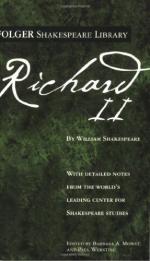|
This section contains 6,650 words (approx. 17 pages at 400 words per page) |

|
Richard II presents several aspects of kingship, including the notions of the legal right to rule as king, the divine right to rule, and the effectiveness of one's rule as king. The "divine right" of kings refers to the notion that the right to rule is ordained by God, not by the popular consent of the people. Lewis J. Owen observes that the characters of Richard and Bolingbroke each represent an important aspect of kingship in relation to Queen Elizabeth. Richard stands for the divine right to rule and Bolingbroke represents effective, "kingly"_ leadership. Owen argues that Shakespeare takes care in the play to treat both Richard's and Bolingbroke's claim to the throne sympathetically. Our sympathy for Richard is generated by three factors, Owen states. The first is the fact that Richard is surrounded by "evil" advisors. Owen notes that while to modern readers this may seem...
|
This section contains 6,650 words (approx. 17 pages at 400 words per page) |

|




